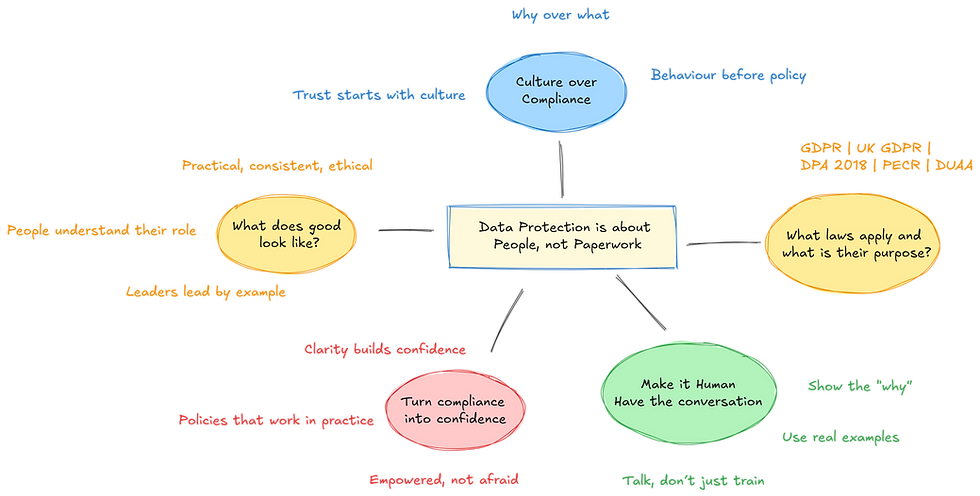GDPR Made Human: Why Compliance Starts with People
- Laura Palmariello
- Oct 22, 2025
- 4 min read
If Data Protection and GDPR still feel like that mystery ingredient at the back of your cupboard that you just can’t bring yourself to deal with, you’re not alone.
Many organisations still see compliance as paperwork, policies, or something that sits quietly in the background, collecting dust until something goes wrong. And let’s be honest, many people think it’s dull.
Imagine you’re part of a fresh, forward thinking organisation built around culture, people and innovation and then someone mentions GDPR. The energy shifts instantly. Eyes glaze over. The fun fades.
But what if data protection didn’t have to be about what organisations must or must not do?
What if we brought the focus back to stories and people, because at its core, data protection exists to protect people. Yes, it is a law, but at heart it’s there to regulate what should already be common sense: doing the right thing with information that belongs to someone else.
When we approach it with an ethical mindset, most of what the law asks for is what we’d naturally want to do anyway.
Every piece of personal data belongs to someone with a story, a past, and a reason for trusting your organisation. Whether it’s a job application, a patient record, a parent’s phone number, or a staff file, that data represents a real person who’s counting on you to look after it properly.
When we lose sight of that, compliance becomes a boring tick-box exercise. It's not just about evidencing what you have done to protect people's information in theory, what matters is what you have done in practice.
Why people matter more than policies
Policies, procedures, and training are important, but they only work if people understand why they exist.
I’ve seen organisations where the training is almost perfect and the privacy notices tick every box, yet staff still share information they shouldn’t, and service users still feel unsure or confused. It's not because organisations and staff don’t care, but because the rules and policies often feel disconnected from real life. If we don't understand why we’re doing what we’re doing, and how it connects to our everyday jobs or lives, it’s almost impossible to care enough to do it well.
That’s where culture comes in.
Compliance happens when people see the link between personal data and trust, when they understand that privacy isn’t about stopping work, it’s about doing it right.
A strong culture of data protection isn’t built overnight, but it starts with small things: open conversations, visible support from leadership, and policies that make sense in practice.
Without that understanding, even the best-written policies or DPIAs are meaningless.
From fear to confidence
Too many people still treat GDPR like a threat one way or another.
That mindset stops learning and innovation.
Instead, we should see it as a framework for confidence. When your teams know how to handle data safely, they don’t have to second-guess every decision. They can focus on their work, knowing they’re doing the right thing.
The most successful organisations I’ve worked with talk about data protection as part of good customer service, not legal compliance.
They don’t ask “what can’t we do?” — they ask “how can we do this safely?”
Most importantly, they ask and they question. If we are not willing to do that, we can't inspire change or innovation.
And once we do, everything changes.

Three small changes that make a big difference
Bring it into conversations
Talk about privacy in meetings, projects, and planning sessions, not just once a year during training. Make it part of your agenda at all levels.
Simplify your documents
If your policies or forms need translating for staff to understand them, they’re too complicated. By all means, keep the detailed versions for senior leaders, but don’t make everyone else’s lives harder than they need to be.
Over time, policies and procedures should make life easier, not soul destroying. The goal should be to get the right people knowing the right things at the right time.
Imagine your staff actually celebrating how painless your induction process is.
Show the ‘why’
Use real stories, an email sent to the wrong person, a misplaced file, to help people see why the rules exist. No need to make them up, there is plenty of stories out there, you just have to look for them. Look for real impacts, because this is where your focus should be anyway.
Small steps like these turn compliance from something people fear into something they value.
The End.......
Data protection is, at its heart, an act of respect.
When people trust you with their information, it’s a reflection of how much they trust your organisation and that trust is worth protecting.
If you can build a culture that sees data protection as part of caring for people, not paperwork, you won’t just be compliant. You’ll be confident, consistent, and trusted.
If you’d like to talk about how to make data protection work day to day in your organisation, get in touch, I’m always happy to chat.
#DataProtection #GDPR #Privacy #Compliance #PeopleAndCulture #Leadership #Ethics #Trust #MakingPrivacyHuman #CultureOfTrust
Comments